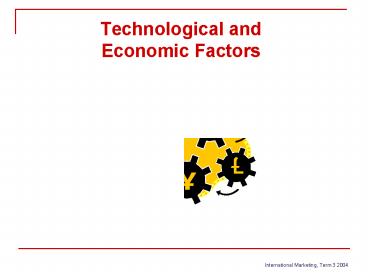Technological and Economic Factors - PowerPoint PPT Presentation
1 / 19
Title:
Technological and Economic Factors
Description:
Luis Vuitton in Japan. International Marketing, Term 3 2004. Unilever in ... Louis Vuitton Japan. How does a luxury brand thrive during an economic recession? ... – PowerPoint PPT presentation
Number of Views:507
Avg rating:3.0/5.0
Title: Technological and Economic Factors
1
Technological andEconomic Factors
2
Session Outline
- Advances in technology
- Economic development
- Market classification
- Marketings role
- Economic crises
- Changing business environment and consumer
behaviour - Impact on marketing strategy
- Case Weight Watchers Mexico
3
Advances in technology
- Impact on international marketing
- New markets
- i.e. Indias software industry exports of over 6
billion in 2000-2001. Expected tenfold increase
in 8 years - New channels of communication
- Increased flow of information
- Within organisations
- B2C
- B2B
- More entrepreneurial approach to
internationalisation - Increased efficiencies and reduced costs
- Global sourcing
4
Economic Development Indicators
- Economic activity
- Primary - Agriculture and extractive processes
- Secondary - Manufacturing activities
- Tertiary - Service activities
- Gross Domestic Product
- Infrastructure
- Highways, railways, trucks and buses in use,
electricity production, newspaper sales - Population growth/birth rate
5
Market Classification
6
What factors might hinder the implementation of
marketing strategies in less developed/
developing markets?
7
Barriers to International Marketing
8
Evolution of Marketing
Determining the needs and wants of target markets
and delivering the desired satisfactions more
effectively and efficiently than competitors in a
way that maintains or improves the consumers and
societys well-being
Society (Well-Being)
Societal Marketing
Consumers (Satisfaction)
Company (Profits)
9
Societal Marketing in Developing Markets
- Nestle - Infant formula controversy
- Developing countries infants were malnourished
or dying because mothers could not properly use
commercial infant formulas - Marketing practices
- General advertising in the public media
- Promoting bottle feeding as the modern way
- Employment of milk nurses (sales agents)
- Distribution of samples to new mothers
- Promotional schemes aimed at doctors, nurses,
health professionals - Culture collision
- Free-enterprise Western culture
- Poorer, less literate, less marketing savvy
cultures
10
Societal Marketing in Developing Markets
- Global boycott of Nestle products 1979
- Adoption of an infant formula marketing code by
the World Health Organisation in 1981 - Restricts the promotion of infant formula
- Requirements for labeling of all infant formula
products - Nestle changed its promotion policy
- Nestle 1999 - Joint working group
- Nestle Research Centre
- International Federation of the Red Cross and Red
Crescent Societies - Provision of food in the field during emergency
relief
11
Economic Crisis Indicators
- Economic crises are increasing in frequency and
severity - More than 65 serious financial crises have
erupted over the past ten years almost one and
a half times the number recorded during the 1980s - Crises are characterised by the co-movement of
many macroeconomic indicators - Decrease in real output (GDP)
- High levels of inflation
- High levels of unemployment
- Unstable currency
12
What impact did the Asian Crisis have on both the
business environment and consumer behaviour?
13
Changing Business Environment
- Research indicates that the Asian crisis
- Accelerated the opening of the Asian economies
- Forced Asians to acknowledge good corporate
governance - Made the region concentrate on its real
competitive strengths - Provided a hard lesson about globalisation
- Forced a withdrawal of government from key
economic sectors - Finance, insurance, banking and
telecommunications - Prompted companies to revamp business strategies
to pursue aggressively opportunities for
expansion in new markets
14
Changing Consumer Environment
Changed Consumer Values
(Reid, 1999)
15
Surviving an Economic Crisis
- Unilever in Indonesia
- Luis Vuitton in Japan
16
Unilever in Indonesia
- Marketing Strategy
- Changed marketing objectives
- Altered product packaging
- Minimise role of wholesalers
- Distribution network to reach small villages
- Strengthened relationships with retailers
- Performance
- Sales have steadily increased
- Keys to success
- Learning from past experience
- Rapid response
- Flexibility
- Willingness to adapt
17
Louis Vuitton Japan
- How does a luxury brand thrive during an economic
recession?
18
Case Weight Watchers Mexico
19
Summary Key Points
- Information technology innovations
- Facilitated an increase in international
marketing activity - Technological change
- New technologies create new markets and
opportunities - Pose a threat to old technologies and industries
that might be tied to them - Economic growth
- Often outweighs other environmental factors
- Economic development
- Marketing in less developed countries requires a
societal marketing orientation - Economic crisis
- Can present both problems and opportunities

